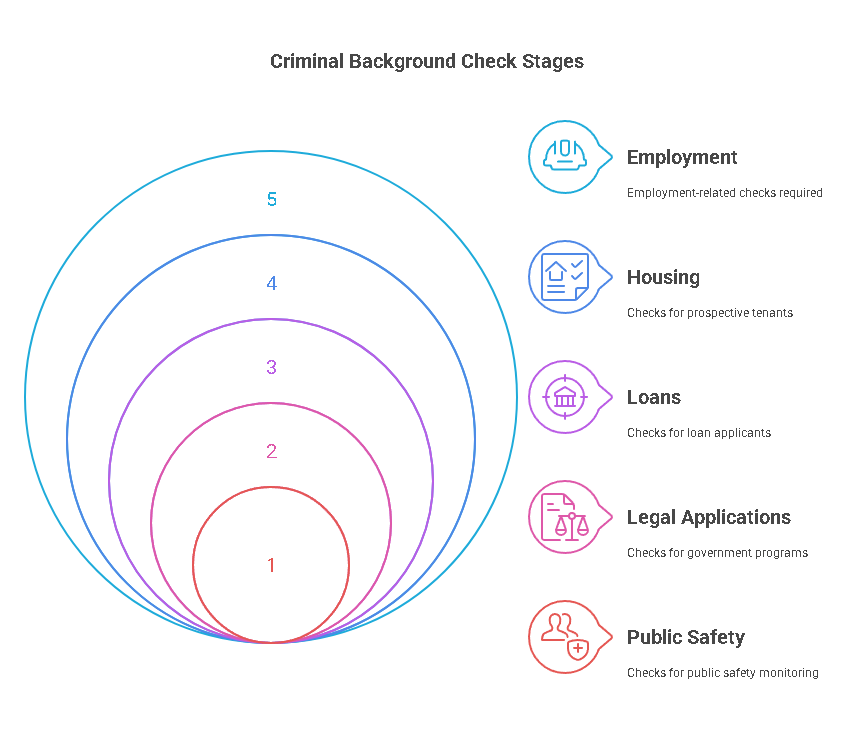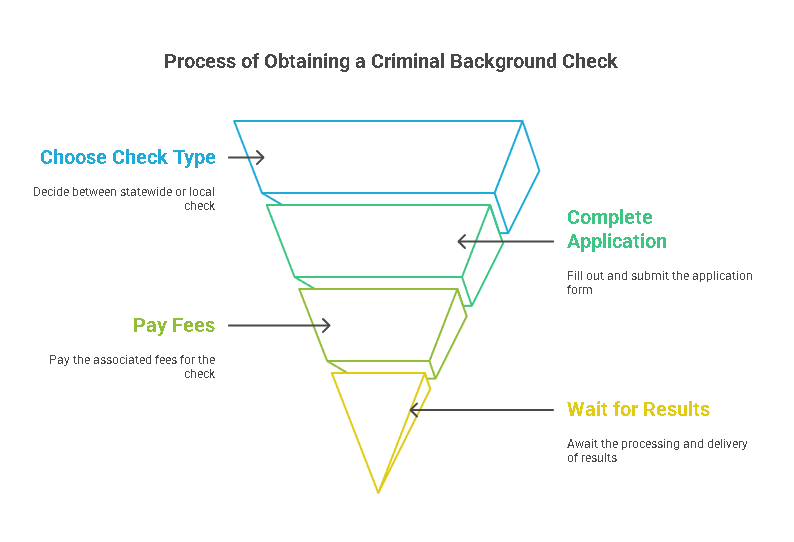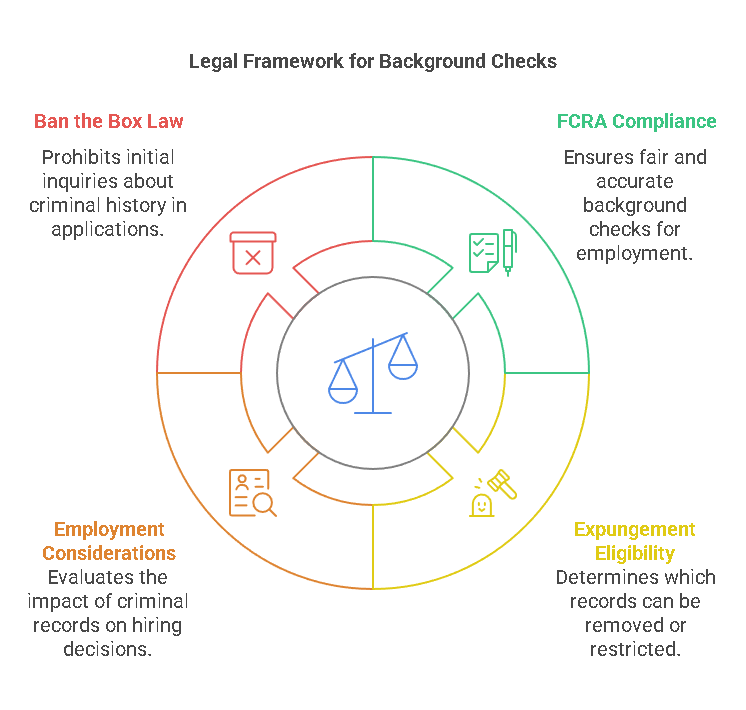Understanding Criminal Background Checks in North Carolina

What is a Criminal Background Check?
A criminal background check is a process through which an individual’s criminal history is examined to uncover any records of criminal activity. This typically includes information such as arrest records, convictions, pending charges, and other relevant criminal data. In North Carolina, criminal background checks are used to verify the criminal history of individuals applying for jobs, renting property, or seeking various public services.
Criminal background checks in North Carolina are primarily conducted by the North Carolina State Bureau of Investigation (NCSBI), local law enforcement agencies, or through third-party service providers. These checks help organizations and individuals make informed decisions based on the criminal history, if any, of a person in question.
In North Carolina, criminal background checks are used in various contexts, including employment screening, housing applications, loan approvals, and more. They are an essential part of ensuring safety, security, and trustworthiness in many professional, financial, and social interactions.
Why are Criminal Background Checks Important in North Carolina?

Criminal background checks are crucial in North Carolina for several reasons:
- Employment: Employers in North Carolina often require criminal background checks to ensure the safety of their workplace and employees. By screening applicants for any past criminal behavior, companies can mitigate risks related to fraud, theft, violence, and other workplace issues. Certain industries, such as healthcare, finance, and education, are particularly strict about criminal history due to the sensitive nature of their work.
- Housing: Landlords and property management companies may require a criminal background check as part of the tenant screening process. This helps ensure that prospective tenants have no history of illegal activities that could pose risks to the property, other residents, or the community.
- Loans and Financial Transactions: When applying for loans, particularly for mortgages or business loans, financial institutions may conduct background checks to assess an applicant’s reliability and trustworthiness. A criminal background check can help lenders gauge any potential financial risks, particularly those related to fraud or other financial crimes.
- Legal and Governmental Applications: Certain government programs, including visa applications or public assistance, may require background checks to assess eligibility or the potential for risk. Additionally, criminal background checks may be mandated in cases where public safety or national security is a concern.
- Public Safety and Community Trust: Conducting background checks helps maintain public safety and community trust, ensuring that individuals who may have a history of violent crime, theft, or other criminal activity are closely monitored in positions of trust or power.
Who Can Request a Criminal Background Check in North Carolina?
In North Carolina, various entities have the authority to request a criminal background check. These include:
- Employers: Businesses, particularly those in sectors like healthcare, education, and finance, often request background checks on job applicants. It helps employers ensure they are hiring individuals who align with the organization’s values and maintain a safe work environment.
- Landlords: Property owners and management companies frequently request criminal background checks as part of the tenant screening process. This helps them assess the potential risks associated with renting out their property.
- Government Agencies: Local, state, and federal government agencies often require criminal background checks for various purposes, such as for permits, licenses, security clearances, or for those applying for public housing or other government services.
- Individuals: An individual can also request a background check on themselves. This is typically done to verify the accuracy of their criminal history records, especially before applying for jobs, housing, or loans. Knowing one’s criminal record in advance allows individuals to address any discrepancies or take appropriate steps if necessary.
How to Obtain a Criminal Background Check in North Carolina

Obtaining a criminal background check in North Carolina is a straightforward process, but it requires following specific steps to ensure accuracy and compliance. Whether you are an employer conducting a background check on a potential employee or an individual seeking verification of your own criminal history, here’s a detailed breakdown of how to request a criminal background check in North Carolina:
Step 1: Gather Necessary Information
Before you begin the request process, you must gather the required personal information. This typically includes:
- Full Name: The individual’s full legal name.
- Date of Birth: The person’s date of birth is necessary to ensure proper identification.
- Current Address: The current residential address of the person being checked.
In some cases, additional details, such as Social Security number (SSN) or previous addresses, may be required to ensure the accuracy of the background check.
Step 2: Choose the Type of Criminal Background Check
In North Carolina, there are two main types of criminal background checks: statewide and local.
- Statewide Criminal Record Check: This check provides a comprehensive overview of an individual’s criminal history throughout the entire state. It can include information about felony and misdemeanor convictions, arrests, and any pending criminal charges recorded in the state’s databases.
- Local Criminal Record Check: This type of check is specific to a particular county or city and only reflects criminal activity within that jurisdiction. It is often used when you need to focus on a specific region, such as checking criminal records for employment purposes within a certain county.
You will need to decide which type of check is required based on your needs. For example, employers may request a statewide check for a more thorough evaluation, while individuals seeking local housing may need a county-specific check.
Step 3: Complete the Application
To initiate the background check, you must complete an application with the appropriate agency. Depending on your type of request (statewide or local), you may apply in one of the following ways:
- Statewide Background Check: For a statewide criminal record check, you can request it through the North Carolina State Bureau of Investigation (NCSBI). This can be done online, by mail, or in person at the NCSBI’s office in Raleigh. You will need to fill out the application form, provide the necessary personal information, and submit any required documents.
- Local Background Check: If you’re looking for a local criminal background check, you will need to contact the local law enforcement agency, such as the police department or sheriff’s office in the specific county or city. The process can vary by location, and in some areas, the check may be available online, while in others, you might need to visit in person.
For both types of checks, you may need to provide a fingerprint card if you are requesting a more in-depth criminal background check. Fingerprints may be required by law enforcement agencies to ensure proper identification, particularly for statewide checks.
Step 4: Pay Fees
There is a fee associated with requesting a criminal background check in North Carolina. The fees vary depending on the type of check and the agency processing the request.
- Statewide Criminal Check: The NCSBI charges a fee for statewide criminal record checks, which is typically around $14 for an online request. You may also have to pay for fingerprinting services if required.
- Local Criminal Check: Fees for local background checks depend on the specific county or city. For example, a local police department may charge a nominal fee for conducting a background check.
Payment for these services can generally be made through credit/debit cards, money orders, or checks. Be sure to confirm the payment methods accepted by the agency handling the background check.
Step 5: Wait for Results
Once your background check request is submitted, it will take some time to process. For statewide criminal checks, results may take anywhere from several days to a few weeks, depending on the method of request (online, mail, or in-person) and the volume of requests the NCSBI is handling. Local checks may be processed more quickly, especially if done in person.
It is important to note that the NCSBI offers expedited processing for an additional fee in some cases. If you need the results sooner, inquire about this option when submitting your request.
Once your background check is processed, the results will be sent to the provided address, or you may be able to access them online, depending on the method of request.
Information Required for a Criminal Background Check
The information required to request a criminal background check in North Carolina includes:
- Full Name: This ensures that the background check is associated with the correct individual.
- Date of Birth: Essential for narrowing down the search and ensuring proper identification.
- Current Address: Helps law enforcement agencies confirm residency history and link records to the right person.
- Fingerprints: For certain requests, particularly those requiring statewide checks, you will need to provide a fingerprint card. Fingerprints ensure that the search is specific to the individual, which is crucial for accuracy.
In some cases, additional information may be requested, such as Social Security number or previous addresses. This helps to ensure that there is no confusion in the criminal record check and that the results are accurate and comprehensive.
Precisehire’s Criminal Background Check Services
Precisehire is a professional service provider specializing in criminal background checks, and it can assist businesses and individuals in North Carolina with their background screening needs. Whether you need a statewide or local criminal background check, Precisehire offers quick and reliable services.
Precisehire’s services can save you time and ensure compliance with the legal standards for background checks, making the process simpler for employers and individuals alike. Their team ensures that all checks are conducted in accordance with local and federal laws, providing accurate and timely results.
Data Table: Criminal Background Check Request Process
Here’s a summary of the steps involved in requesting a criminal background check in North Carolina:
| Step | Description |
|---|---|
| Step 1: Gather Information | Collect the required personal details, such as full name, date of birth, and address. |
| Step 2: Choose the Type of Check | Decide if you need a statewide or local check, based on your specific needs. |
| Step 3: Complete the Application | Submit your request either online, by mail, or in person to the NCSBI or local law enforcement. |
| Step 4: Pay Fees | Pay the applicable fees for processing your criminal background check. |
| Step 5: Wait for Results | Processing times may vary, ranging from several days to weeks, depending on the type of check requested. |
By following these steps, you can ensure a smooth and accurate process for obtaining your criminal background check in North Carolina.
Legal Aspects of Criminal Background Checks in North Carolina

Criminal background checks in North Carolina are governed by a combination of state and federal laws. It’s essential to understand the legal aspects of these checks, particularly when using them for employment, housing, or other legal purposes. Here’s an overview of the critical legal considerations:
Fair Credit Reporting Act (FCRA)
The Fair Credit Reporting Act (FCRA) is a federal law that governs how criminal background checks can be used for employment purposes. This act ensures that background checks are accurate, consistent, and fair. Under the FCRA, employers must obtain written consent from the individual before conducting a criminal background check. Additionally, if an employer decides not to hire someone based on their criminal record, they must inform the individual and provide a copy of the report and a summary of their rights under the FCRA.
Expungement and Sealing of Records
In North Carolina, some criminal records may be eligible for expungement (removal) or sealing (restriction) under specific circumstances. If a record has been expunged or sealed, it may not show up in a background check. However, not all offenses are eligible for expungement, and the process can be complex. For example, certain serious offenses, like violent crimes or sexual offenses, cannot be expunged. It’s important to be aware of these legal processes, as they can affect the results of a criminal background check.
Use of Criminal Records in Employment
While a criminal record may not automatically disqualify an individual from employment in North Carolina, the employer must consider the nature and seriousness of the crime, the time passed since the offense, and the relevance of the criminal history to the job. For instance, a minor offense committed many years ago may not be relevant for a position, whereas a recent felony could impact hiring decisions, especially in positions of trust or with vulnerable populations.
Employers must comply with North Carolina’s Ban the Box law, which restricts employers from asking about an applicant’s criminal history on initial job applications. The employer is allowed to ask about criminal history only after the applicant has been interviewed or deemed qualified for the position.
Frequently Asked Questions
Can I check my own criminal background in North Carolina?
Yes, you can request a criminal background check for yourself in North Carolina. The process is similar to what employers and other entities follow, and you can request a statewide or local check through the NCSBI or local law enforcement agencies. This is often done by individuals who want to ensure their criminal history is accurate before submitting it to potential employers or landlords.
What do I do if I find incorrect information in my criminal background check?
If you find inaccurate or outdated information in your criminal background check, you have the right to dispute it. You can contact the agency that provided the information (such as the NCSBI or local law enforcement) to request a correction. You may also need to provide supporting documents or evidence to prove that the information is incorrect, such as court records or expungement documents.
How long does it take to process a criminal background check?
The processing time for a criminal background check in North Carolina can vary depending on whether you request a statewide or local check. For a statewide check, it typically takes anywhere from 3 to 7 business days, while local checks may be completed more quickly, depending on the jurisdiction. In some cases, expedited services may be available for an additional fee.
Are criminal background checks for employment mandatory in North Carolina?
While criminal background checks are not mandatory for every job in North Carolina, many employers require them as part of the hiring process, especially in sensitive fields such as healthcare, education, or positions involving financial responsibilities. Employers must follow state and federal laws regarding the use of criminal background checks in employment decisions.
Can my criminal background check be used for housing applications?
Yes, criminal background checks are commonly used by landlords and property management companies to screen potential tenants. A criminal history check helps landlords ensure the safety of their property and the other tenants. However, they must follow fair housing laws and ensure that the use of criminal background checks does not discriminate against protected classes.
Conclusion
North Carolina criminal background checks are an essential tool for employers, landlords, and individuals who need to verify someone’s criminal history. Whether you are an employer screening potential employees, a landlord evaluating tenants, or an individual looking to verify your own history, understanding the process, legal requirements, and potential issues with criminal records is crucial.
Following the correct procedures for requesting background checks and being aware of your rights and obligations under state and federal law will ensure a smooth and legally compliant process. Additionally, using reliable services such as Precisehire can simplify the process and provide quick, accurate results, helping businesses and individuals meet their screening needs.
For businesses and individuals alike, staying informed and compliant with legal standards ensures that criminal background checks are conducted fairly and appropriately, helping to maintain trust, transparency, and security across various sectors.
